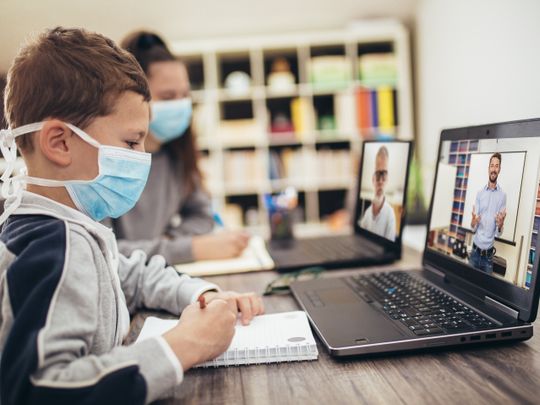
Just under half (49%) of UAE parents are willing to send their children to school every day if classes are conducted with 100% physical attendance, according to a Back-to-School survey commissioned by Centrepoint, and conducted by YouGov, involving more than 500 respondents across the UAE.
The findings from the ‘Back-to-School’ survey, conducted from July 22 to 29, in key GCC markets, highlight parents’ sentiment on schools reopening, the challenges they face with e-learning, and their concerns for the safety of their children at the school following the pandemic.
While schools are still finalising exactly how the operating models will look for the next academic year, the research found that 61% of the parents surveyed are confident about sending their children back to school after the summer break, although only 49% are willing to send their children into physical classrooms on a regular basis with 100% attendance.
Parenting dilemma
As the pandemic continues, parents are faced with the difficult decision of whether to send their children back to school in-person or online. An addendum has been added to the KHDA’s Parent-School contract – which was sent out to parents across the UAE this week – asking parents to choose whether they want to opt for face-to-face learning, distance learning, or a combination of the two. It is made clear that no fee discounts are available for any of the options.
The distance learning model adopted by most schools and universities due to the pandemic was an abrupt and radical change for everyone involved. The biggest challenge faced, according to 62% of parents asked in the Centrepoint survey, was keeping their children motivated and engaged during e-learning, while 51% say they were constantly multitasking and had a difficult time balancing work from home with their kid’s remote learning schedule.
A majority of respondents (43%) say they prefer a hybrid school opening scenario – a mix between virtual and in-person education, with most support for an alternate-day or week staggered schedule for students. Meanwhile the survey shows that 25% of the parents – one in four - are advocating for online learning and want it to continue, however, 19% believe in physical schooling.
Mixed feelings
As the Centrepoint survey shows, parents in Dubai are divided about what is the best path to take, and many have found that different modes of education work better for different age groups.
Swati Vaswani, Indian, a finance professional and mother-of-two, is reluctant to send her children to school in person, and says that she found the distance learning was a very different experience for each child: “My younger one, who is 4 years old, is going to FS2. The distance learning module didn’t work very well for him in FS1 because he wouldn’t like to sit down in front of the computer much. He preferred to play and learn. So I ended up making my own ways to teach him. Also, he has been keeping unwell and has a low immune system. I do not want to risk sending him to school in this scenario. I may opt for homeschooling him at least until a vaccine is out or the Covid cases are next to negligible.”
Swati’s Grade 2-level daughter, on the other hand, loved the distance learning set-up, although she missed other elements of in-person school: “She is a very social being and really misses school and her friends and teachers. We may just go for distance learning with her for the first term and resume face to face learning as and when the Covid situation improves.”
Weighing up mental V physical wellbeing
However for Dubai-based nurse Victoria Browne, British, mum of 3-year-old and 7-year-old boys, the return to in-person school is very welcome: “I’m sending the boys back because I think keeping them at home damages their social and mental wellbeing, and I think it causes more anxiety.” Victoria says that for her, as a working mum, the distance learning model did not work for her family at all; “We all found it very difficult”. She says she is in two minds when it comes to the threat from the virus: “Obviously there is also the worry about the fact that the virus is still here, and is it going to be weird for them going in with screens and their teachers wearing masks and being in groups and not having their normal play time? But then again I think they’ve adapted well to the new normal so far, and they’re now used to wearing their masks, using hand sanistiser and having their temperatures checked. I think that if people are happy to take their kids to hotels or to malls, then why not back to school?”
The Centrepoint survey data also indicates that hygiene and safety protocols employed by the school is one of the key factors that will influence the choice of 64% of parents. Moreover, 52% believe that availability of the COVID-19 vaccine is the second important aspect to consider while 46% will be assessing the school’s reopening guidelines and plans to understand how they will ensure a safe and healthy learning environment for the students.
“The way this country has dealt with the pandemic is really commendable and I have full faith in the system,” says mum-of-two Swati. “Also, I know that each school will do everything in their right to make sure that everyone is safe. However, the country is opening up tourism. There will be an influx of people from around the world. Also, kids are as likely to carry the virus as an adult. They may be asymptomatic but they could still be carriers. Some other countries have already begun school and have had a rise in cases. So in my opinion, it is better to wait for at least a month or two and then decide.”
In all of the uncertainty, there’s only one thing for sure, says Simon Smith, Chief Operating Officer of Centrepoint, said: “Going back to school won’t look the same this year.”








